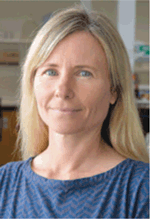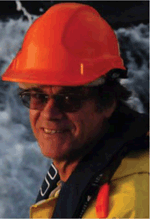Innovation and technology in marine science: AIMS’ North West Shoals to Shore Research Program – an update
Miles J.G. Parsons A B C , Karen J. Miller A , Michele Thums A , James P. Gilmour A , Luciana C. Ferreira A , Robert D. McCauley B and Mark G. Meekan AA Australian Institute of Marine Science, Indian Ocean Marine Research Centre, Level 3, The University of Western Australia, Fairway, Crawley, WA 6009, Australia.
B Centre for Marine Science and Technology, Curtin University, Bentley, WA 6104, Australia.
C Corresponding author. Email: m.parsons@aims.gov.au
The APPEA Journal 59(2) 679-682 https://doi.org/10.1071/AJ18043
Accepted: 28 March 2019 Published: 17 June 2019
Abstract
In 2017, the Australian Institute of Marine Science and its partners commenced the North West Shoals to Shore Research Program. The program is designed to address significant scientific and environmental knowledge gaps pertinent to the management of the offshore petroleum industry, a key stakeholder in this ecologically and commercially important region of Australia. The program comprises four themes.
1. Marine noise monitoring and impacts: includes two seismic source (2600 cubic inch air-gun array) exposure experiments have been conducted to investigate selected responses by demersal fishes and pearl oysters across different spatial and temporal scales.
2. Seabed habitats and demersal biodiversity: seeks to understand the physical and biological characteristics of the ancient coastline key ecological feature around the 125 m depth contour and pearl oyster habitats offshore from Eighty Mile Beach. The work examines the ecological processes that maintain benthic communities on both ancient and contemporary coastlines
3. Protected and iconic species movement, distribution and threats: uses innovative sampling techniques to confirm biologically important areas for pygmy blue whales, hawksbill and green turtles. This will assist the quantification and mitigation of the risks vessel movements, industrial infrastructure and activities pose to marine megafauna on the Northwest Shelf.
4. Spatial dynamics of isolated coral reef atolls: develops a habitat model and adaptive monitoring program that informs the future condition of these remote coral reef atolls.
Significant progress has been made by the program in 2018, including the development of innovative and technical approaches to sampling.
Keywords: connectivity, habitat modelling, key ecological feature, marine megafauna movement, marine noise, seismic source exposure.

Dr Miles Parsons attained his PhD at the Centre for Marine Science and Technology, Curtin University, in 2010, where he remained as a Research Fellow until December, 2017. He then joined the Australian Institute for Marine Science as a Research Scientist, focussing on underwater acoustics and, in particular, the NWSS Research Program. |

Dr Mark Meekan is a Senior Principal Research Scientist at the Australian Institute of Marine Science based in Perth, Western Australia. He is a fish ecologist with interests ranging from the early life history of reef fishes to the ecosystem role and function of elasmobranchs. Mark has published over 200 papers in international journals and he currently supervises postdoctoral fellows and PhD students on working shark and reef fish projects throughout the Indian and Pacific oceans. |

Dr Karen Miller was awarded her PhD from James Cook University in 1995. Her career has focused on benthic ecology from the tropics to Antarctica, and has included positions with research institutes, universities and government agencies. In her present role with the Australian Institute of Marine Science she leads a team of scientists undertaking research to underpin the Sustainable Use of North-West Marine Ecosystems. This research includes developing a knowledge-base of offshore and coastal benthic ecosystems, establishing ecosystem status, and the development and implementation of monitoring programs. |

Dr Michele Thums received her PhD from the School of Zoology, University of Tasmania in 2009. Her first postdoctoral research position was a joint position between the University of Western Australia Oceans Institute and the Australian Institute of Marine Science (AIMS) from 2010-2013. Thereafter she has been employed as a Quantitative Ecologist in the Sustainable Use of North-West Marine Ecosystems program at AIMS. She is responsible for the development and application of models describing and predicting the movement and distribution of marine megafauna (e.g. marine mammals, sea turtles and sharks). |

Dr James Gilmour obtained his undergraduate degree at James Cook University, and his PhD at the University of Western Australia. He is currently a Research Scientist at the Australian Institute of Marine Science. His research focuses on the ecology and long-term dynamics of coral reefs in north-western Australia. |

Dr Luciana Ferreira received her PhD from the School of Animal Biology, University of Western Australia in 2017. She is currently a postdoctoral scientist at the Australian Institute of Marine Science (AIMS) with the NWSS research program. She is responsible for the development and application of models to distribution and movement data of marine megafauna (principally large cetaceans, sea turtles and sharks) in North-West Australia and understanding key threats, especially as they relate to industry. |

Associate Professor Robert McCauley began his science career in 1987 working in the area of underwater acoustics, receiving his PhD in 2001 from James Cook University. Rob has been working at Curtin University since 1996 developing hardware, techniques and analytical approaches for passive acoustic monitoring and understanding impacts of man-made sound on marine fauna. His research includes studies on the impacts of seismic survey air gun sources on animals from plankton to whales. |


